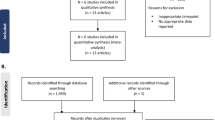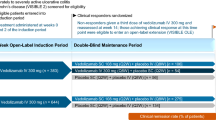Abstract
Background and Aims
Efalizumab is a monoclonal antibody targeting CD11a, an adhesion molecule involved in the activation and trafficking of T-lymphocytes. This agent has proven efficacy in the treatment of psoriasis. We performed an open-label study to evaluate the efficacy and safety of efalizumab in Crohn’s disease (CD).
Methods
Fifteen subjects with moderate to severe CD (Crohn’s Disease Activity Index [CDAI] score 220–450) and who were refractory or intolerant to standard therapy, received a weekly 1 mg/kg subcutaneous injection of efalizumab for 8 weeks. The primary endpoint was clinical response (decrease in the CDAI score of at least 70 points) at week 8. Secondary endpoints included change in mean CDAI scores, the proportion of subjects who achieved clinical remission (CDAI score ≤ 150), change in the Inflammatory Bowel Disease Questionnaire (IBDQ) scores, and report of adverse events.
Results
At 8 weeks, ten (67%) subjects had clinical response and six (40%) were in remission. The mean baseline and week 8 CDAI scores were 300 and 167 respectively (P < 0.001). Mean IBDQ scores at baseline and week 8 were 124 and 168 respectively (P < 0.001). One subject with Crohn’s colitis had pre- and post-treatment colonoscopy that demonstrated mucosal healing. No serious adverse events occurred.
Conclusions
Efalizumab induced a clinical response in the majority of subjects with moderate to severe CD in this small, open-label pilot study. There were no serious adverse events reported during this short-term trial.


Similar content being viewed by others
References
Sandborn WJ. Clinical perspectives in Crohn’s disease. Moving forward with anti-TNF-alpha therapy: current needs and future treatments. Rev Gastroenterol Disord. 2007;7:S23–S35.
Gordon KB, Papp KA, Hamilton TK, et al. Efalizumab for patients with moderate to severe plaque psoriasis: a randomized controlled trial. JAMA. 2003;290:3133–3135.
Fischer A, Durandy A, Sterkers G, et al. Role of the LFA-1 molecule in cellular interactions required for antibody production in humans. J Immunol. 1986;136:3198–3203.
Dustin ML, Springer TA. Lymphocyte function-associated antigen (LFA-1) interaction with intercellular adhesion molecule-1 (ICAM-1) is one of at least three mechanisms for lymphocyte adhesion to cultured endothelial cells. J Cell Biol. 1988;107:321–331.
Werther WA, Gonzalez TN, O’Connor SJ, et al. Humanization of an anti-lymphocyte function-associated antigen (LFA)-1 monoclonal antibody and reengineering of the humanized antibody for binding to rhesus LFA-1. J Immunol. 1996;157:4986–4995.
Bernstein CN, Sargent M, Rector E. Alteration in expression of beta 2 integrins on lamina propria lymphocytes in ulcerative colitis and Crohn’s disease. Clin Immunol. 2002;104:67–72.
Daperno M, D’Haens G, Van Assche G, et al. Development and validation of a new, simplified endoscopic activity score for Crohn’s disease: the SES-CD. Gastrointest Endosc. 2004;60:505–512.
Schreiber S, Khaliq-Kareemi M, Lawrance IC, et al. Maintenance therapy with certolizumab pegol for Crohn’s disease. N Engl J Med. 2007;357:239–250.
Hanauer SB, Feagan BG, Lichtenstein GR, et al. Maintenance infliximab for Crohn’s disease: the ACCENT I randomised trial. Lancet. 2002;359:1541–1549.
Colombel JF, Sandborn WJ, Rutgeerts P, et al. Adalimumab for maintenance of clinical response and remission in patients with Crohn’s disease: the CHARM trial. Gastroenterol. 2007;132:52–65.
Guttman-Yassky E, Vugmeyster Y, Lowes MA, et al. Blockade of CD11a by efalizumab in psoriasis patients induces a unique state of T-cell hyporesponsiveness. J Invest Dermatol. 2008;128:1182–1191.
Leonardi C, Papp K, Gordon K, et al. Extended efalizumab therapy improves chronic plaque psoriasis: results from a randomized phase III trial. J Am Acad Dermatol. 2005;52:425–433.
Food and Drug Administration (FDA). FDA approves updated labeling for psoriasis drug Raptiva. 2008. Available at: http://www.fda.gov/bbs/topics/NEWS/2008/NEW01905.html. Accessed 14 December 2010.
Kleinschmidt-DeMasters BK, Tyler KL. Progressive multifocal leukoencephalopathy complicating treatment with natalizumab and interferon beta-1a for multiple sclerosis. N Engl J Med. 2005;353:369–374.
Van Assche G, Van Ranst M, Sciot R, et al. Progressive multifocal leukoencephalopathy after natalizumab therapy for Crohn’s disease. N Engl J Med. 2005;353:362–368.
Soler D, Chapman T, Yang LL, et al. The binding specificity and selective antagonism of vedolizumab, an anti-alpha4beta7 integrin therapeutic antibody in development for inflammatory bowel diseases. J Pharmacol Exp Ther. 2009;330:864–875.
Acknowledgments
The authors wish to thank Genentech, Inc. for their funding and support of this project. Genentech, Inc. (South San Francisco, CA) provided drugs and funding for this study, but did not assist with writing of the manuscript.
Author information
Authors and Affiliations
Corresponding author
Rights and permissions
About this article
Cite this article
James, D.G., Seo, D.H., Chen, J. et al. Efalizumab, a Human Monoclonal Anti-CD11a Antibody, in the Treatment of Moderate to Severe Crohn’s Disease: An Open-Label Pilot Study. Dig Dis Sci 56, 1806–1810 (2011). https://doi.org/10.1007/s10620-010-1525-6
Received:
Accepted:
Published:
Issue Date:
DOI: https://doi.org/10.1007/s10620-010-1525-6




